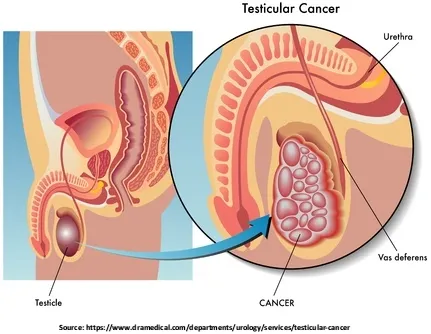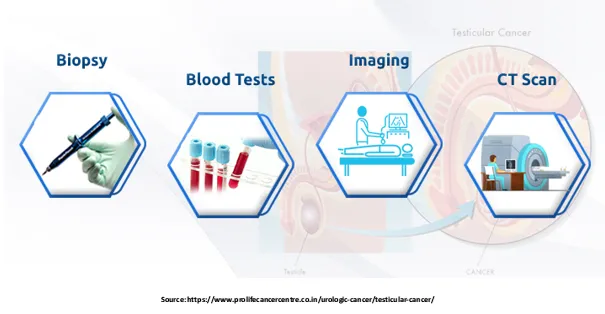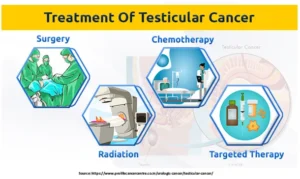Testicular Cancer Treatment in Bangalore, India
Cell division is a natural process that keeps your body’s functions running smoothly. However, cancer can develop when cells begin to divide uncontrollably, resulting in lump formation or abnormal growth in the body. The critical feature of cancer is that it can develop in any region of the body, and as it grows, it may spread to other parts of the body.
More and more means of detecting early warning symptoms of testicular cancer and other types of cancer have emerged due to technological breakthroughs in the medical field, allowing for a more significant possibility of treatment’s success.
Dr. Sandeep Nayak, Chairman of Oncology Services in Karnataka, India, is one of the top surgical oncologists in the country. He provides the most advanced and effective therapies for various malignant conditions, including testicular cancer in India. Dr. Nayak is an expert in a variety of surgical procedures used to treat testicular cancer. He also has extensive experience with conventional, laparoscopic, and robotic cancer surgeries.
Please go through this article to know more about testicular cancer and the treatments available for testicular cancer in India.
What Exactly is Testicular Cancer?
If you wonder where testicular cancer can be found, it’s cancer that develops inside a man’s testicles. The scrotum is a loose sac-like structure that lies beneath the penis.
The testicles are the male reproductive glands in the scrotum that produce sperm and the male sex hormone (testosterone) in the body. During diagnosis, Dr. Sandeep Nayak, a seasoned oncologist, may recommend thorough monitoring and suitable treatment for testicular cancer in India.

Let us now take a look at,
Signs and Symptoms of Testicular Cancer
Cancer can develop in both testicles in rare situations, although it generally develops in one of them. The following are some of the most prevalent symptoms:
- Painless lump in one of the testicles
- Swelling or heaviness in the scrotum, with or without pain
- Fluid collection in the scrotum
- Testicular or scrotal soreness or pain
- Swelling in lower extremities
- Low back, abdomen, chest, or head pain
If you observe any of the above symptoms over two weeks, consult an experienced oncologist in India for a precise analysis.
Diagnosis of Testicular Cancer in India
Cancer growth might be detected during self-examination if you feel a lump or notice a change in the size of your testicle. During a routine examination, your doctor can also detect it.
To determine if it is a malignant testicular lump and rule out other conditions, the doctor can do the following tests and screenings:

Ultrasound scan
If a testicular lump is discovered during a physical examination, the doctor will usually order an ultrasound scan. An ultrasound scan assists the doctor in determining the kind and position of the lump and, as a result, choosing the likelihood of a testicular cancer diagnosis.
Blood Tests
Specific proteins and enzymes, such as alpha-fetoprotein and beta-human chorionic gonadotropin (HCG), might float in the circulation due to testicle cancer. Their raised blood levels aid the doctor in detecting cancer in the body and its type and spread. A tumour marker test is a type of cancer blood test.
Biopsy
In this procedure, some testicular tissue is extracted and inspected under a microscope for the presence of cancer cells. However, there is a slight chance that cancer will spread via the scrotum if you do so. As a result, the doctor may opt for surgery to remove the entire testicle and then examine it for malignancy.
If cancer is found, the doctor will order more tests such as X-rays and CT scans to confirm the disease hasn’t spread to other parts of the body.
However, it’s important to remember that not all lumps are malignant, and groin pain or discomfort could result from underlying health problems.
The best treatment for testicular cancer in India will be determined by the type of cancer, its stage, and the patient’s overall health and preferences. An honest discussion with the doctor will enable them to recommend the best course of action, and the patient will be able to make an informed decision.
Standard Treatment Options for Testicular Cancer in India
In the early stages of testicular cancer, a proficient oncologist in India may recommend the patient to observe the tumor to see if it grows any further. After a later stage of detection, the doctor may suggest the following treatment options:
1. Surgery
Radical Orchiectomy: It is a surgical procedure in which the doctor creates an incision in the groin and removes the entire testicle if cancer is present. In this case, getting an appropriate prosthetic following the cancer treatment procedure is also a viable option.
Testis-Sparing Surgery: The doctor focuses on the testicle tumour while leaving the testicle in place. Small tumours may be treated with this procedure.
Retroperitoneal Lymph Node Dissection: It is a complex procedure. The doctor creates an incision in the abdomen and carefully removes the lymph nodes from the back of the abdomen while avoiding damage to adjacent nerves. When cancer has progressed to the lymph nodes, doctors frequently conduct this sort of cancer treatment surgery.
2. Radiation therapy
This method uses high-powered beams to kill the cancer cells on the testicles or lymph nodes.
Radiation beams are used to target cancer cells in specific areas of the body. Radiation therapy for cancer kills cancer cells by destroying their DNA, preventing them from developing any further.
After surgery, this method may be used to guarantee that any leftover cancer cells are eliminated, preventing them from recurring. Patients may experience some cancer treatment side effects, such as nausea, exhaustion, and a drop in sperm count, but these will subside when the treatment is completed.
3. Chemotherapy
Following surgery, the doctor may recommend chemotherapy to destroy any leftover cancer cells and prevent a recurrence. Chemotherapy is a multi-stage method that kills cancer cells by using cancer treatment medications. Patients are given these treatments orally or intravenously. They work throughout the body, wherever testicular cancer has spread.
Chemotherapy, like radiation therapy, has temporary side effects like nausea, diarrhoea, hair loss, and so on, depending on the cancer treatment drugs and the length of treatment.
4. Chemotherapy with Stem Cell Transplant:
Chemotherapy drugs can kill healthy cells, including those that make blood, during the process. Doctors may give patients high doses of chemotherapy in the later stages of testicular cancer, necessitating a stem-cell transplant. Doctors transplant stem cells into the patient’s vein, similar to a blood transfusion. These stem cells then settle in the bone marrow, where they mature into healthy blood cells.
Book an appointment with Dr. Sandeep Nayak, a highly-qualified and experienced surgical oncologist in India, to avail of advanced and effective cancer treatment.
Frequently Asked Questions
Is it possible to prevent testicular cancer?
It is impossible to prevent testicular cancer because doctors do not know its exact cause. Even if a genetic mutation causes it, you will not be able to prevent it.
Can the patient have sex after testicular cancer treatment?
After your body has recovered from testicular cancer therapy, it is normal to have intercourse. Each case is unique, but after a few months, you should be able to resume your regular sex life.
How long does it take for a testicular cancer patient to recover?
After two weeks post testicular cancer surgery, most patients can resume their routine. However, for roughly a month, you must refrain from any physical activity.
How successful is the treatment of testicular cancer in India?
You should know that testicular cancer has the best prognosis than any other type of cancer, with a cure rate of more than 90%. The testicular cancer survival rate is relatively high. However, it is critical to have it noticed and diagnosed as soon as possible and seek medical treatment if any anomalies, pain, or other symptoms are discovered.

